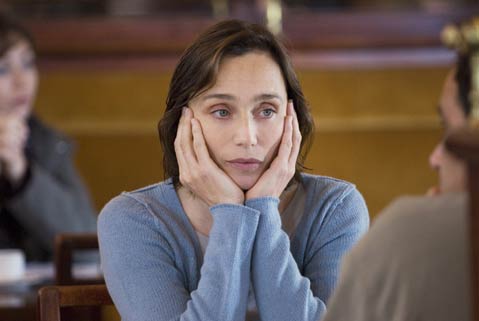I’ve Loved You So Long
Kristin Scott Thomas, Elsa Zylberstein, and Serge Hazanavicius star in a film written and directed by Philippe Claudel.

In this intriguing film, most memorable for Kristin Scott Thomas’s performance, we join a sad story already in progress, and slowly back up and move sideways through the back story. That central narrative ploy becomes a driving magnetic force at the center of the movie, but writer-director Philippe Claudel doesn’t always keep his project on an artful keel. At times, eddies of sentimentality and wavering qualities of filmmaking and acting tend to drag the movie down. But right there, set solidly in the middle of the thing while also basking in enigmatic mystique, is Thomas, the most compelling emotional ghost on screen this year.
Looking various shades of pale, and deprived of the vitality that keeps a person moving forward, is Thomas’s Juliette, a woman recently released from a 15-year prison sentence for a complex “crime” that we only gradually learn about. In prison, she reports, she was called “the Absent One,” and that absence continues in the blinding daylight of her so-called freedom. Landing back on her feet, in small degrees, Juliette lives with her younger sister (Elsa Zylberstein)-who only briefly knew her in their childhood-and her family.
Claudel has structured his script as a dizzying, but also meditative maze of family relations of diverse and sometimes harrowing dimensions. Their mother greets her, in a haunting hospital scene, with alternating currents of embracing warmth and harsh detachment. Meanwhile, Scott’s character comes out of her shell in slow, sideways steps. Sex with a stranger does nothing to fill the void, but she tells a new platonic friend that hanging out in cafes and engaging in conversations are “what I missed most in prison.” Eventually, in a cathartic release of a finale, the mysteries are resolved and we learn of deeper definitions of what it means to be trapped “inside.”
I’ve Loved You So Long ends up being a sad and occasionally sweet ballad of a film in which the subject is melancholic reflection on fate and family, in all its complicated forms. It’s about a haunted woman’s struggle to get to the point where she can firmly say, once again, “I’m here.”



